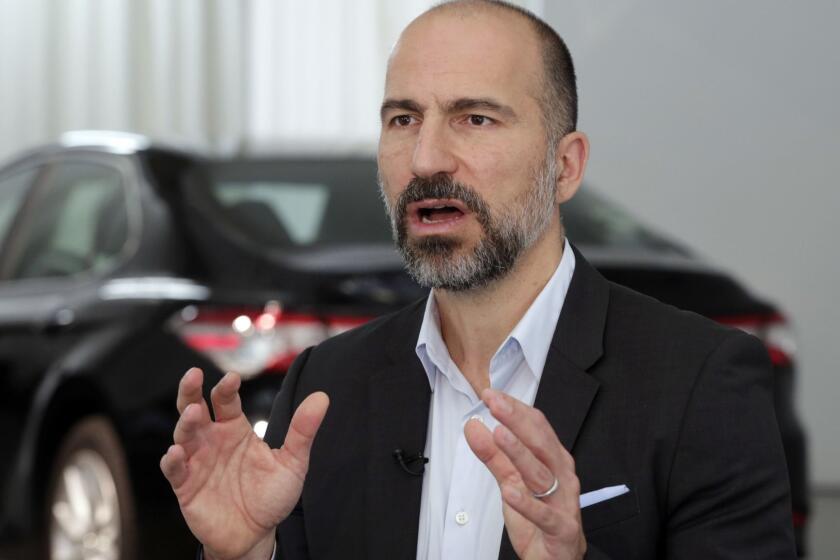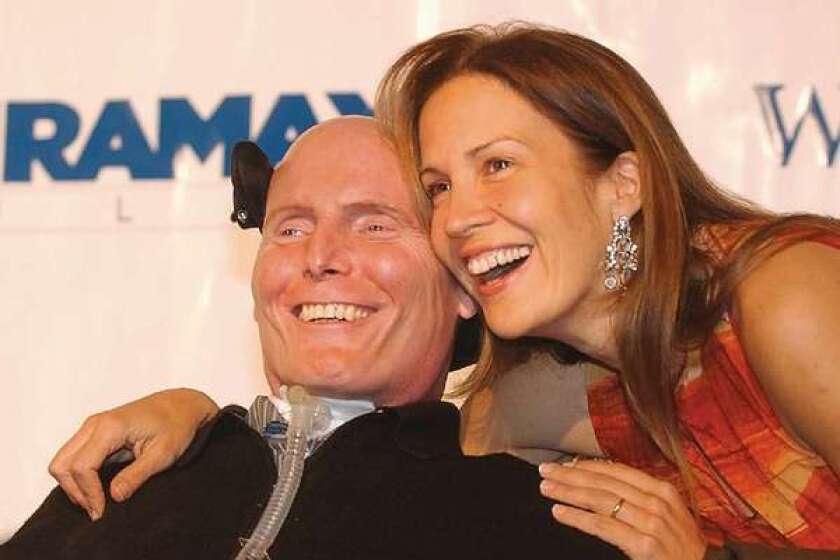Column: My preelection wrap-up of California’s special-interest ballot measures
- Share via
It’s no longer a secret that California’s ballot initiative process, which was created as a counterweight to corporate influence, has become a tool for corporate interests to thwart the public interest.
The November ballot brings that trend to unprecedented heights, thanks largely to several initiatives through which huge corporations are attempting to make their own laws or overturn existing laws.
My coverage of these initiatives and others has stretched over several months, so here’s a convenient wrap-up, with the latest financial tallies and an explanation of how I’m voting on the measures.
Prop 22 is the most dangerous potential labor law that I have seen in my lifetime.
— UC Hastings labor law expert Veena Dubal
Let’s start with what may be the worst, most dishonest ballot measure in California history.
Proposition 22: This is the effort by Uber, Lyft and a few other gig economy companies to carve out an exemption for themselves from California labor law. These companies, which thrive on reducing their drivers to peons, have broken all records in their spending to promote this initiative.
As I write, the war chest is approaching a mind-boggling $191 million, more than any other initiative campaign in American history.
The companies’ goal is to eviscerate California’s AB 5. That’s the law mandating that those drivers and many others working at jobs that are central to their employers’ business be treated as employees rather than “independent contractors.”
The distinction is major. Employees are entitled to wage and hour protections, paid expenses such as gas, workers compensation and unemployment coverage, Social Security coverage and the right to organize. Independent contractors are not.
The Proposition 22 ballot campaign by Uber and Lyft just became the most expensive such campaign ever.
The companies have stated candidly that AB 5 will increase their costs, so it’s better for them to stick their drivers with as much in expenses as they can. They claim that Proposition 22 will give drivers minimum wage protection and other benefits. Don’t believe them. As we’ve reported, the wage and benefit provisions are miniscule.
And don’t be fooled by the drivers appearing in pro-22 commercials talking about how much they value the “flexibility” they get from being their own boss.
The drivers supporting Proposition 22, as a general rule, are part-timers who typically last six months or less in these jobs, before discovering how unprofitable they are and bailing out. Full-time Uber and Lyft drivers, who know that they’re working as hard as employees, tend to be supporters of AB 5 and opponents of Proposition 22.
“Prop 22 is the most dangerous potential labor law that I have seen in my lifetime,” Veena Dubal, a labor law expert at UC’s Hastings College of the Law, said in a recent tweet. “The potential that it has to do the political and cultural work to destroy labor protections across the service economy keeps me up at night.”
The companies behind Proposition 22 don’t take that criticism lightly. They’ve spent some of their war chest to fund a smear campaign against Dubal. That should give you an indication of how far they should be trusted. My vote: A strong No.
Proposition 14: This proposal to increase funding for the California stem cell program by $5.5 billion is a perfect example of the drawbacks of allowing a public program to turn into one individual’s personal hobby horse.
In this case, the individual is Robert Klein II, a Northern California real estate developer who drafted and promoted Proposition 71 of 2004, the $3-billion initiative that created the program formally known as the California Institute of Regenerative Medicine, or CIRM, and who led the program as chairman during its formative years. Klein has contributed more than $6.6 million to the initiative campaign.
CIRM has funded much worthy scientific research. But it has struggled since its creation with the outsized expectations that Klein’s advertising campaign for Proposition 71 engendered — namely, that the program would yield “cures” for conditions including Parkinson’s, Alzheimer’s and diabetes.
The California Institute for Regenerative Medicine is seeking a new $5.5-billion infusion. It must go back to the drawing board.
The route to cures was always more complex than the campaign led on, and none has yet emerged for those headline maladies. Meanwhile, CIRM has come almost to the end of its original $3-billion endowment.
Proposition 14 replicates some of the established downsides of Proposition 71. It leaves CIRM almost entirely without legislative oversight, which is a terrible idea for an agency endowed with taxpayer funding on this scale.
CIRM’s quest for renewed funding could have occasioned serious stock-taking over how it has performed thus far and how and whether California taxpayers should continue supporting the program directly. Instead, the institute left that task to Klein, who developed the new initiative behind closed doors.
One could make the case that CIRM warrants more funding, but not this way. It’s time to dispense with the notion that taxpayer-funded research should be managed in secret. My vote: A regretful No.
Proposition 15: This is the proposal to create a “split roll” in property taxation by allowing commercial and industrial properties to be reassessed every three years, regardless of whether they’ve changed hands in the meantime.
It would be the first major revision of Proposition 13, the 1978 initiative that rolled back and limited property taxes. As I reported this weekend, Proposition 13 was pitched to voters as a safeguard against the steep property tax increases the experienced through the 1970s, but it turned out to be a particular boon to commercial and industrial property owners.
Opposition comes from those sectors; support from teacher unions and other entities attracted by the prospect that the initiative might generate as much as $11.5 billion in new revenue per year for schools, community colleges and local governments. My vote: Yes.
Proposition 23: This is another run at tightening regulations on dialysis clinics sponsored by the Service Employees International Union, which has been trying to unionize the clinics. It’s the other attractor of big money on the ballot — more than $100 million spent so far, mostly by the dialysis industry and overwhelmingly by the two big firms in the sector, DaVita and Fresenius.
As we’ve reported in the past, the dialysis companies are the quintessential profit-seeking enterprises in healthcare. Their profiteering practices almost destroyed the Affordable Care Act by driving up costs for insurance companies participating in Obamacare. Their profits are obscene.
As it happens, Proposition 23 wouldn’t do much to rein in those profits — efforts to cap their income in California have consistently failed. This initiative would require that every dialysis clinic be staffed with a doctor and make regular reports about adverse events. That’s not enough. My vote: No.
Could a reassessment of Proposition 13 finally be in the wings?
Proposition 24: This initiative would tighten California’s landmark privacy law, which stands to be a model for other states and the federal government — if Big Business doesn’t succeed in eroding it.
The measure’s main proponent is Alastair Mactaggart, a Northern California real estate investor who was behind enactment of the original law in 2018 and has contributed $5.7 million to the ballot effort. The ballot measure would make it harder for business interests to tamper with the law through legislative changes.
Privacy advocates are split on the measure, which is a shame; some complain that it doesn’t do enough. That’s an odd position, given how hard it is to get any privacy regulation enacted into law. My vote: Yes.

California’s Prop. 25 would end cash bail in California. But critics of cash bail are divided over the risk assessments that would replace it.
Proposition 25: Sometimes the people behind the curtain out themselves when money is at stake. That’s what seems to have happened with Proposition 25, which would confirm a 2018 law ending California’s discriminatory system of cash bail and give more authority to judges in criminal courts to decide whether a defendant can be released pending trial.
The bail industry, which opposes the initiative, likes to pose as a collection of mom-and-pop bail bond firms. In fact, the industry fronts for big global insurance companies, which finance bail bonds and reap enormous profits.
The top contributors to the No on 25 are all insurance companies or their bond firm fronts. As latest count, they’ve put up $8.1 million to defeat the initiative; supporters have raised nearly $7 million, including $5 million from the family of Clippers owner Steve Ballmer, reflecting his interest in criminal justice reform.
Cash bail is a system that benefits wealthier defendants and consigns low-income defendants to imprisonment before trial. It’s costly for them and for the state: According to the Policy Institute of California, nearly two-thirds of the state’s more than 80,000 inmates were awaiting trial or sentencing in 2014. The bail business is one that should have been eradicated long ago. My vote: Yes.
More to Read
Inside the business of entertainment
The Wide Shot brings you news, analysis and insights on everything from streaming wars to production — and what it all means for the future.
You may occasionally receive promotional content from the Los Angeles Times.














